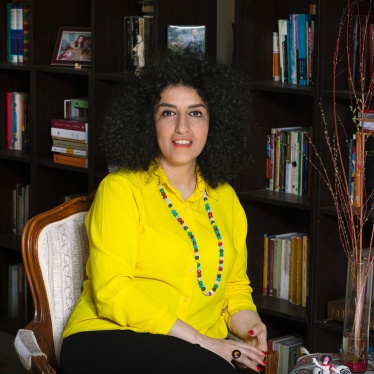(New York) - Officials of the Rwandan popular justice system known as gacaca should immediately review a recent judicial decision that found the surgeon and former presidential candidate Dr. Theoneste Niyitegeka guilty of complicity in genocide, Human Rights Watch said today.
Dr. Niyitegeka, a surgeon who cared for untold numbers of wounded persons during the 1994 genocide, sought to oppose President Paul Kagame in the 2003 presidential elections. Niyitegeka was originally acquitted of all charges in October 2007 but was found guilty by an appeals court on February 5, 2008. The appeals court provided no reason for overturning the acquittal.
“The evidence presented in this case is vague and contradictory. No convincing proof supports a guilty verdict for Dr. Niyitegeka,” said Alison Des Forges, senior Africa advisor at Human Rights Watch. “Rwandan officials now need to correct this serious case of injustice.”
The decision comes at a moment when judges at the International Criminal Tribunal for Rwanda and a judge in the United Kingdom are evaluating the fairness of Rwandan judicial processes as they consider sending Rwandans accused of genocide back to Rwanda for trial. The gacaca jurisdictions are part of the overall Rwandan judicial system, but under Rwandan law they would not be the venue for trials of persons sent back from abroad.
During the 1994 genocide against Tutsi, soldiers and militia members sought out targeted persons in hospitals as well as in churches and schools. In this case, Dr. Niyitegeka is accused of having turned over a hospital patient to killers at Kabgayi hospital, where he was a surgeon.
The chief witness gave vague and contradictory testimony about the date of the alleged crime, saying both that it happened in early April and that it occurred after the arrival of patients transferred from a hospital in Kigali, an event that took place in late May 1994.
The only other witness against Dr. Niyitegeka gave testimony at the trial that contradicted testimony she had given on a prior occasion.
At least a dozen witnesses, including doctors and nurses who worked with Niyitegeka every day, testified he was innocent of the charges. They also provided additional factual information that contradicted assertions of the accusers.
One Tutsi survivor of the genocide testified movingly that Dr. Niyitegeka had provided her with excellent care for a terribly festering wound.
“Really I didn’t know that a doctor could agree to treat such a disgusting thing. He was someone who treated all patients, without distinction,” this genocide survivor told the court. “He showed a love for others like I’ve never seen before.”
Dr. Niyitegeka’s case was heard as part of an innovative judicial system known as gacaca, created to try more than one million cases resulting from the 1994 genocide of Tutsi in Rwanda. According to the National Service of Gacaca Jurisdictions, gacaca judges, who are elected and have only a few days of training in legal matters, tried hundreds of thousands of cases, most of them since April 2007. The process was due to finish at the end of December, but the government recently decided to shift thousands of cases, previously set for conventional courts, into the gacaca system.
Like customary courts, gacaca jurisdictions can sentence convicted persons to terms of up to life in prison. Unlike conventional courts, however, gacaca jurisdictions do not permit the accused the right to legal counsel. In addition to an appeals proceeding, which resulted in the verdict against Dr. Niyitegeka, the Rwandan gacaca system also provides for further review by another group of judges. Officials of the National Service of Gacaca Jurisdictions may order such a review.
Human Rights Watch said there are questions as to whether a political motivation may be driving the inexplicable appellate decision to convict Dr. Niyitegeka. In 2003, recently returned from the United States, Niyitegeka sought to oppose President Paul Kagame in the presidential elections that year. His candidacy was refused by the electoral commission and he was briefly detained on charges of “divisionism” just before the election. Rwanda is now preparing for legislative elections to be held in late 2008.
Dr. Niyitegeka, who has occasionally commented on Rwandan political questions for the local and foreign press, criticized the gacaca system in an interview on the Voice of America radio service in 2005. He was interrogated by the police about his comments and, intimidated by the experience, he fled the country briefly. Upon his return, unidentified assailants blew up his car, parked behind his house. Soon after, soldiers came to his home to try to pressure him into disavowing his criticism of gacaca.
After the doctor was acquitted of genocide charges by the gacaca court in Gihuma sector, Southern Province in October 2007, the person who had brought the charges appealed the acquittal. The appeals court scheduled hearings but postponed them three times for lack of witnesses. When the appeals court convened on February 5, judges discussed the case for eight hours inside a small building, sometimes shouting so loudly that they could be heard by the large audience waiting outside for the verdict.
Late in the afternoon, judges said they had overturned the acquittal because there were “new elements” in the case, but they gave no explanation of what those were. They sentenced Dr. Niyitegeka to 15 years in prison.
Uniformed and armed soldiers attended the trial as well as the appeals hearing, an unusual occurrence. After Dr. Niyitegeka was convicted, he was immediately put in the back of a military pickup truck and taken away in the rain.
“When facts seem lacking to back up a judicial decision, it’s easy for people to suppose outside interference,” said Des Forges. “The more often this happens the faster the system loses credibility. In this case, the disconnect between facts and judgment is dramatic and the way his acquittal was overturned raises serious questions. For the good of the system, and to see justice for Dr. Niyitegeka, officials should immediately review the decision.”






